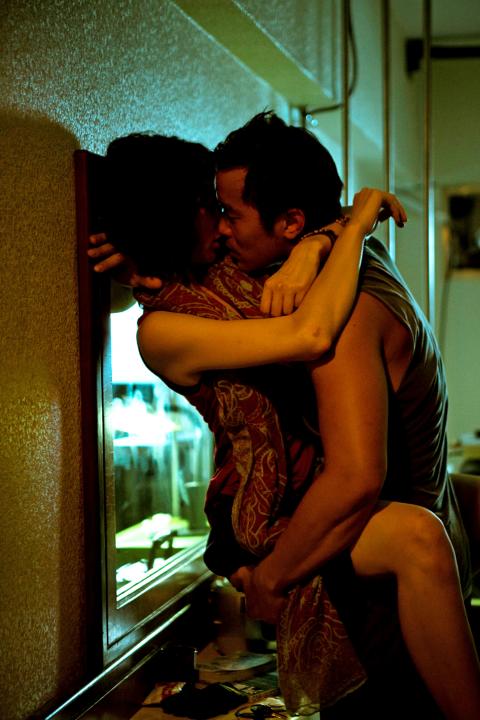Seven years after her fatherhood comedy-drama Run Papa Run (一個好爸爸) , Sylvia Chang (張艾嘉) returns to the director’s chair with Murmur of the Hearts (念念), her most accomplished film to date. Emotionally resonant and quietly introspective, it revolves around three psychologically scarred characters struggling to make peace with their past. The mix of dreams, reality, magical realism and disjointed narrative is as messy as it is ambitious, and it is firmly anchored by top-notch performances by actors from Taiwan and Hong Kong.
The film centers on Mei (Isabella Leong, 梁洛施), a painter who has a troubled relationship with her boxer boyfriend, Hsiang (Joseph Chang, 張孝全). Gruff and reticent, Hsiang is not a particularly talented fighter, and channels most of his energy into training. The couple’s lustful rendezvous, which are against the coach’s orders, accentuate their solitude and alienation.
Mei’s occasional emotional outbursts don’t make things better. “I was seeing a man with no shadow walking past me,” she says over a payphone to her lover, who is preoccupied with his own thoughts.

Photo courtesy of Applause entertainment
The scene, occurring early in the movie, heralds the supernatural incidents that follow.
In Mei’s recurrent childhood memories on Green Island (綠島), her loving mother Jen (Lee Sinje, 李心潔) tells her and her older brother Nan (Lawrence Ko, 柯宇綸) a fairy tale about a mermaid every night. During the day, the children catch beached fish and throw them back into the sea as if they are “angels,” as the mother gently calls them.
Now living in Taipei, Mei is beset by unresolved feelings toward her dead mother, who left her boorish husband and took the little girl with her to Taiwan proper.

Photo courtesy of Applause entertainment
Nan, who was left behind, grows up to become a tour guide on Green Island, a place where political prisoners were held during the Martial Law era, and cannot resolve whether or not to look for his sister and mother, whose death remains unknown to him.
Hsiang, too, has his own ghosts from the past. The childhood memory of his long-dead father, a sailor who was rarely home and eventually drowned at sea, pushes Hsiang to pursue the boxing — a career he believes his father wanted him to pursue.
Crippled by their anger, confusion and remorse, the three take their different paths to come to terms with the past, leading to a somewhat predictable reconciliation, though one that is genuinely moving.
The script by Sylvia Chang and Taiwan-based Japanese actor Yukihiko Kageyama moves between symbolism, melodrama and fantasy. At times, scenes are heavily laced with expository dialogue, leaving little to the imagination and leading to sequences that drag on and emotions that are repetitive and tedious. But when the director does it right, the film sparkles with poetry.
It’s no exaggeration to say that Murmur of the Hearts belongs to the actors as much as, if not more than, the director. Making a comeback to the silver screen, Hong Kong actress Leong imbues her role as a damaged, slightly neurotic woman with a subtle sensibility. Taiwan’s Joseph Chang dives into the dark side, gathering enough sensitivity to create an entirely believable man fighting his demons.
Jen, like many of Sylvia Chang’s most sympathetic heroines, yearns to be free from a stifling relationship. While the fragmented flashbacks of a love affair reveal little of her inner world, Lee has an ethereal presence, as if she exists only in the memories of her children.
At the most poignantly tender moments of the film, the mother returns in Nan’s dream. In his childhood home, the son, all grown up, meets his youthful mother. They talk, feeling the quiet, aching longing in every word they utter. It is a moment that transcends reality and lingers long after the credits.

June 23 to June 29 After capturing the walled city of Hsinchu on June 22, 1895, the Japanese hoped to quickly push south and seize control of Taiwan’s entire west coast — but their advance was stalled for more than a month. Not only did local Hakka fighters continue to cause them headaches, resistance forces even attempted to retake the city three times. “We had planned to occupy Anping (Tainan) and Takao (Kaohsiung) as soon as possible, but ever since we took Hsinchu, nearby bandits proclaiming to be ‘righteous people’ (義民) have been destroying train tracks and electrical cables, and gathering in villages

Swooping low over the banks of a Nile River tributary, an aid flight run by retired American military officers released a stream of food-stuffed sacks over a town emptied by fighting in South Sudan, a country wracked by conflict. Last week’s air drop was the latest in a controversial development — private contracting firms led by former US intelligence officers and military veterans delivering aid to some of the world’s deadliest conflict zones, in operations organized with governments that are combatants in the conflicts. The moves are roiling the global aid community, which warns of a more militarized, politicized and profit-seeking trend

Dr. Y. Tony Yang, Associate Dean of Health Policy and Population Science at George Washington University, argued last week in a piece for the Taipei Times about former president Ma Ying-jeou (馬英九) leading a student delegation to the People’s Republic of China (PRC) that, “The real question is not whether Ma’s visit helps or hurts Taiwan — it is why Taiwan lacks a sophisticated, multi-track approach to one of the most complex geopolitical relationships in the world” (“Ma’s Visit, DPP’s Blind Spot,” June 18, page 8). Yang contends that the Democratic Progressive Party (DPP) has a blind spot: “By treating any

The wide-screen spectacle of Formula One gets a gleaming, rip-roaring workout in Joseph Kosinski’s F1, a fine-tuned machine of a movie that, in its most riveting racing scenes, approaches a kind of high-speed splendor. Kosinski, who last endeavored to put moviegoers in the seat of a fighter jet in Top Gun: Maverick, has moved to the open cockpits of Formula One with much the same affection, if not outright need, for speed. A lot of the same team is back. Jerry Bruckheimer produces. Ehren Kruger, a co-writer on Maverick, takes sole credit here. Hans Zimmer, a co-composer previously, supplies the thumping